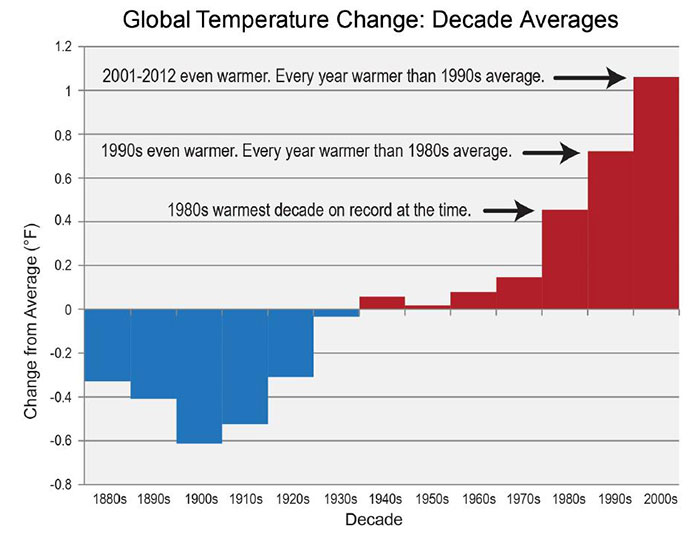But, for the sake of convenience, let me recap. Some climate scientists came to the conclusion that we might be entering a cooling trend in the 1970s and the planet could experience some long-term cooling in the years to follow. Notice, cooling trend and long-term cooling are not the same as an imminent ice age. However, Peter Gwynn, a writer with Newsweek, wrote a 16-paragraph article that ended up as the cover story for that week's edition of Newsweek. This article was then picked up by other news media and repeated. An imminent ice age was not the scientific consensus, rather something the news media reported.
A reading of the article is quite interesting. For one thing, it wasn't all that wrong. Look at this plot of temperatures since 1900. There is a definite upward trend in the first half of the 20th century, followed by a pronounced downward trend from the late 1940s through about 1970. The climate scientists of the 1970s were right, the worldwide temperature was falling.

Source: Skeptical Science
This also highlights another false claim of the deniers, the one where they state that the climate goes through cycles. The obvious implication of that statement is since the climate goes through cycles, we are just in a naturally occurring warming cycle. The fact is, the climate actually does go through natural cycles, but we are in a naturally occurring cooling cycle right now. Imagine how much hotter it would be if we were in a natural warming cycle. Of course, we don't know when this current cooling cycle will end. Stand by for some real good times when that happens.
But, now, the author of that article is speaking out. Peter Gwynn wrote an article where he discusses his original article and what has happened since then. To his credit, Mr. Gwynn takes responsibility for any misrepresentation he might have made and states,
Speaking personally, though, I accept that I didn't tell the full story back then. Indeed, the issue raises questions about the relationship between science writers and scientists as well as the attitudes toward science of individuals with political agendas.He also states later in the article,
Here I must admit mea culpa. In retrospect, I was over-enthusiastic in parts of my Newsweek article. Thus, I suggested a connection between the purported global cooling and increases in tornado activity that was unjustified by climate science. I also predicted a forthcoming impact of global cooling on the world's food production that had scant research to back it.
But, I can't blame Mr. Gwynn too much and he gives the very reason why. The science at the time was poorly formed. Today, climate science has progressed with remarkable advances. Our understanding of the climate, how it works and what it was like in the past is dramatically different today than it was 40 years ago. There has really been a staggering amount of progress in this regard. Mr. Gwynn was writing in the 1970s and had to write about what was known in the 1970s. He was not at fault for our lack of understanding. I do think, though, that he over represented what the scientific consensus of the day was (see the Skeptical Science link above).
Mr. Gwynn also had a comment in the conclusion that was right on the money,
Climatologist are pessimistic political leaders will take any positive action to compensate for the climatic change, or to even allay its effects.
That, of course, is precisely the situation we are currently in and the fossil fuel industry is spending hundreds of millions of dollars to prevent anything from being done.
Our understanding of climate science can be compared to our understanding of cancer. Are there things about cancer we don't understand? Yes, you bet there are. Should we throw out all oncologists because of that? No. If you or someone you love has cancer are you going to ignore the doctors and do your own thing? Some people do. Ask Steve Jobs how well that worked out. Oh, yeah. You can't because he's dead. Maybe if he had listened to the oncologists (who still don't understand everything) instead of trying some kind of 'alternative' treatment, that wouldn't be the case. The fact that we don't know everything does not mean we know nothing.
The same is true for climate science. Do we know everything? Not even close. Should we throw out all of the climate science because the fossil fuel industry finds it troubling? No, not ever. What the deniers want us to do is the equivalent of what Steve Jobs did. Our understanding of climate science has progressed enormously and we understand it much better than ever before. All we are going to do from here on out is to improve our understanding, not throw out what we have already figured out.
Ultimately, the climate is warming and we are going to have to do something about it. Take a look at this figure from NASA and the National Climate Assessment.

No comments:
Post a Comment